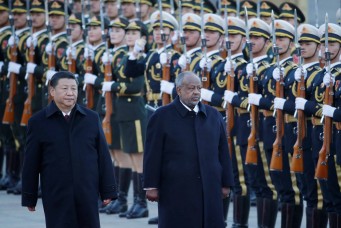Parliamentary Dreams
Taekwondo world champion and member of Egypt’s parliament Caroline Maher is determined to be a voice for the voiceless: Egyptians with disabilities.
At age 11, Caroline Maher began an unlikely quest. After seeing other little girls kicking up a storm at a Taekwondo class, she took up the sport and quickly began piling up tournament victories. Over the next dozen years she competed in thirty-nine countries, won nearly 130 medals, and was ranked third worldwide. In 2013, the fifth-degree black belt champion became the first African and Arab woman to be inducted into the Taekwondo Hall of Fame.
Achieving her dream inspired Maher, now 29, to help others find the same fulfillment and acceptance in society. She became a founder of Helm (the word for “dream” in Arabic), an Egyptian non-profit organization that advocates for Egyptians with disabilities and their families. When she became a member of Egypt’s House of Representatives last fall—appointed by President Abdel Fattah El-Sisi as part of a tradition to boost minority participation—she was determined to be a voice for the voiceless in the Egyptian parliament. “What Helm and myself are looking for is an inclusive society in which our abilities and competencies are the only way to be perceived,” Maher, a graduate of the American University in Cairo (’09), explained in an interview. “I dream of a world that would accept us all, no matter how different we are.”
To Maher, one of the main challenges facing Egypt is how to tolerate differences. “We as a society need to understand that each and every one of us has our own rights,” she said. “We are all entitled to the same rights, regardless of the physical state we are in. I can always bring the critical issues that I have learned about through my work with Helm into the parliament, being a voice for people with disabilities on the inside, not from my point of view but from the point of view of people with disabilities.”
Maher is aware of the daunting task of serving in parliament amid the political turmoil that has roiled Egypt over the past five years. “This parliament came after the new constitution and two revolutions, which has caused its performance to be scrutinized,” she said. “In addition to that, most of the MPs are either trying to find a new way to do things in order to separate the present from the past, or, like myself, are still exploring the political world and focusing on how to do things well and properly, as fast as possible, in order to achieve what we aim for.”
She sees her role as championing people with disabilities but also advocating for all of her constituents who share common everyday struggles. “My life so far has exposed me to all shades of Egyptian society,” she said. “Being on the street as a normal person every day also helps me understand people’s needs and concerns. From that viewpoint, I will make sure to exert an effort [to guarantee] that all our policies are not only necessary, but considerate of the people.”
In spite of the ongoing political and social conflict, Maher is optimistic about Egypt’s future: “I tend to trust that once we figure out how to manage everything properly, there will be no stopping us.”



